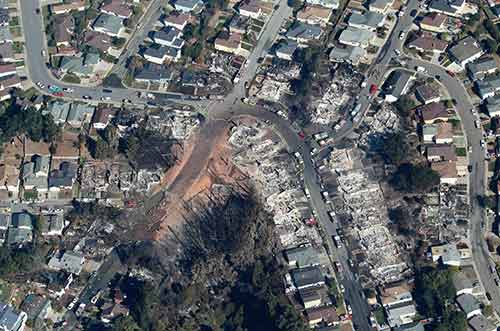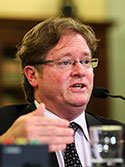
An aerial photo shows the destruction wreaked on the Crestmoor residential neighborhood in the City of San Bruno following a PG&E gas pipeline explosion on September 9, 2010. Eight people were killed as a result of the blast and ensuing inferno. Photo via FEMA.
From the City of San Bruno
February 6, 2013
The California Public Utilities Commission refuses to comply with the Public Records Act by failing to produce public documents believed to show improper contact between senior management and judges related to the Sept. 9, 2010 Pacific Gas & Electric (PG&E) pipeline explosion in San Bruno, demonstrating the ongoing “cozy relationships” between the CPUC and PG&E that federal investigators determined to be a leading cause of the explosion and fire, San Bruno City officials said in a lawsuit filed yesterday.
San Bruno is seeking an order from the Superior Court to force the CPUC to comply with California Law and fulfill four separate public record requests dating back more than 10 months, which all relate to the ongoing process to determine PG&E’s penalty and fine for the 2010 explosion and fire that killed eight people, injured 66 and destroyed scores of homes.
San Bruno legal action demands immediate release of the records under the California Public Records Act.
“We are concerned the leadership of the CPUC is in the pocket of the utility company it is supposed to regulate. Our lawsuit calls for full transparency so that the people of San Bruno and the citizens of California can be confident about the integrity of this long penalty process against PG&E,” said San Bruno Mayor Jim Ruane. “We will continue to be vigilant in this process as part of our continued efforts to protect the safety of every Californian.”

CPUC Executive Director Paul Clanon.
At the center of San Bruno’s legal filing is an email correspondence from Executive Director Paul Clanon to the Administrative Law Judges that violates the CPUC’s own rules and demonstrates improper communication and influence between the CPUC’s senior management and the judges tasked with determining whether to levy a recommended $2.45 billion penalty and fine against PG&E.
In one thread, Clanon is believed to have directed the judges to rule in a particular way on pending motions that affect the outcome of the PG&E penalty proceedings, presenting a clear “willingness on the part of CPUC staff to improperly tamper with the adjudicatory process in the Line 132 Proceedings,” according to a Nov. 19 letter submitted by San Bruno officials to CPUC staff, which warned that the City would take further action unless the CPUC complied with the outstanding records requests.
Attorneys for the CPUC have repeatedly declined to produce this email thread, claiming a legal argument known as the “deliberative process privilege,” in which they argue that releasing the contents of those documents could influence the outcome of the proceedings.
San Bruno attorneys say this claim allows CPUC senior management to engage in improper contact without any way for it to be made public.
Instead, San Bruno officials believe the CPUC’s resistance to full transparency may stem from an unwillingness to “further embarrass the PUC by evidencing its continued cozy relationship with PG&E and lax oversight over the public utility company that the PUC is – by constitutional mandate – required to regulate,” according to its lawsuit.
“More than two years ago, federal investigators identified the too-cozy relationship between PG&E and the CPUC. We believe these records are critical to demonstrating whether any real reform has occurred since that time,” said Marc Zafferano, San Bruno’s City Attorney. “But 10 months after making a series of simple public records requests, the CPUC has refused to comply, leading us to question what the agency is trying to hide.”
Between May 2013 and January 2014, San Bruno requested 17 categories of documents related to interactions and communications among Commissioners, the Safety Enforcement Division and PG&E. To date, the CPUC has failed to provide documents that satisfy any of San Bruno’s requests and, in some cases, it has failed to even respond to the requests in violation of the Public Record Act’s 10-day requirement.
The CPUC’s excuses for not producing the records have ranged from the deliberative process privilege to arguing that it was “very busy” and would respond when it had free time – a “response that makes a mockery of the value of public participation within its own government,” according to the suit. Every public agency in California has an obligation to respond to requests for public records as a result of legislation that was adopted by the state more than 40 years ago.
San Bruno officials say these records are important because they may reveal the very problems that federal investigators identified as a cause of PG&E’s persistent and troubling inability to maintain accurate gas pipeline records, which continues to threaten the public’s safety by keeping the utility at risk for future pipeline failures.
In December, PG&E was fined $14 million for hiding faulty pipeline records in San Carlos – creating yet another dangerous public safety risk that one of PG&E’s own engineers likened to possibly “another San Bruno situation,” in an internal email to PG&E executives.
“Improper communications, unholy and cozy relationships between CPUC staff and PG&E, and possible backroom deals are all part of the disturbing and ongoing problems contributing to PG&E’s failure to maintain a safe system and the CPUC’s failure to provide needed regulatory oversight,” Mayor Ruane said. “An open, honest and fully transparent process is the only way that we can ensure the safety of PG&E’s gas pipelines so that what happened in San Bruno never happens again, anywhere.”


 The Hunger Site
The Hunger Site
February 12, 2014 at 9:42 pm
most of the time it’s the private citizen that is suing to access records, but when one agency is suing another agency it’s a 3-way screwing for the taxpayer….. in the state of cali our laws are very clear – public records are the people’s business – http://www.libionline.net/california-public-records-act.html
February 7, 2014 at 10:50 pm
CPUC too close to PG&E? California’s big energy companies, PG&E and SoCal Ediison are revolving doors to the CPUC.